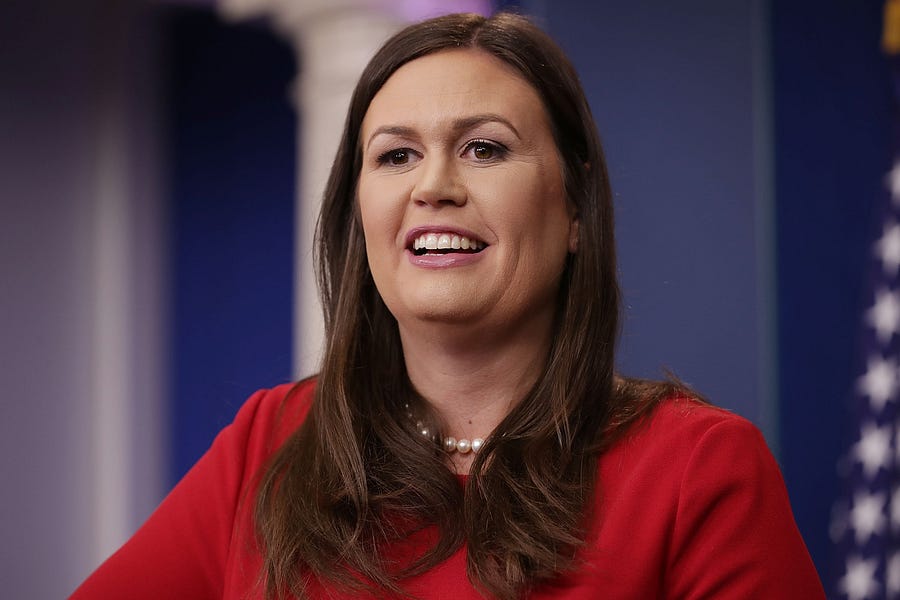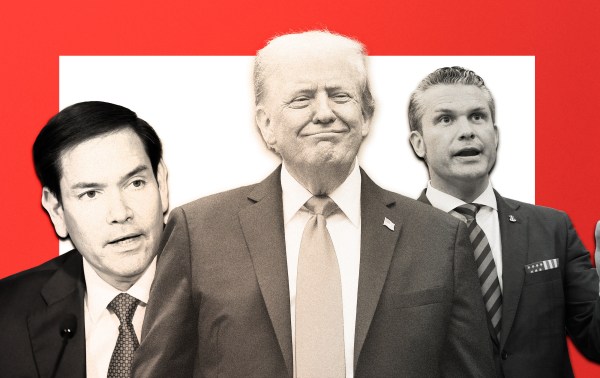Campaign Quick Hits
Nikki Haley Is Definitely Not Not Running: “I would not run if President Trump ran, and I would talk to him about it,” Haley said this week. “That’s something that we’ll have a conversation about, at some point, if that decision is something that has to be made,” said the former South Carolina governor and U.N. ambassador under Trump. I have no idea what she was trying to say after the “she won’t run against Trump” part. But this is the clearest indication yet that the Republican field will narrow very quickly if Trump decides to run again in 2024. And that would-be leaders in the Republican Party have no doubt that Trump still controls the vast majority of GOP primary voters.
And just how much power do they think he has? Trump has endorsed Sens. Ron Johnson, Rand Paul, and Marco Rubio. Johnson, remember, hasn’t even said he’s running again. On the other end of the spectrum, Sen. John Thune also hasn’t said whether he will run again, but he’s in a much different boat—one with a Trump-sized hole in it. In December, Thune remarked that GOP House efforts to overturn the election results “would go down like a shot dog” in the Senate. As a result of that accurate statement, Trump threatened that Thune would be “primaried in 2022, political career over” and referred to him as “Mitch’s boy.” You’ll be shocked to learn that wasn’t a compliment: Just this week, Trump referred to Senate Minority Leader Mitch McConnell, the highest-ranking elected Republican, as a “dumb son of a b----.” Thune has been on the defensive ever since, saying that “being afraid of a fight or somebody coming after me is not something that's going to influence” his decision on whether to run for reelection.
The message to the GOP: The Trump era is far from over.
Good for Business: Need more proof? Missouri GOP Sen. Josh Hawley raised $3 million during the first three months of the year, which is “more than 10 times what some of his colleagues have raised at a similar point in their terms.” And $600,000 of that came in the days after the January 6 riot, as video rocketed around the internet showing Hawley pumping his fist as the crowd gathered outside the Capitol that afternoon. During the same three months in 2019, he raised only $43,000. Of course, one of his colleagues across the rotunda outraised him this quarter: Marjorie Taylor Greene reported $3.2 million.
That is the power of earned media. Every headline, every provocative tweet, every outraged segment on cable news equals money in the campaign coffers.
Bad News for 2022 Republicans: Gallup reported the highest party affiliation gap favoring Democrats in nearly a decade. Thirty percent of Americans “identified as Democrats and 19% were Democratic-leaning independents, while 25% were Republican identifiers and 15% Republican-leaning independents.” That’s a 9-point deficit for Republicans. But some things to bear in mind. First, Republicans usually have a deficit in this poll. Second, the 11 percent of independents who don’t lean toward either party is more than enough to sway any electoral outcome. And third, the last time party affiliation favored Democrats this much was in 2012—and two years later, Republicans shellacked them anyway, picking up 13 House seats and nine Senate seats. So maybe it’s not really bad news for Republicans after all.
Worth Your Time: If you are interested in a deep dive from one of the best polling outfits in the country on why they think their 2016 and 2020 polls underestimated support for Donald Trump and what they plan to do about it, this report from the Pew Research Center is a must read. The question they try to answer: whether Pew “is in any way underrepresenting Republicans, either by recruiting too few into the panel or by losing Republicans at a higher rate.”
It is a rare and detailed writeup of how polling works. For example, participants in the Pew surveys are “recruited offline via random national sampling of residential addresses.” But prior to 2018, Pew used telephone-based recruitment. Could that account for why they had a 7 percent drop off in recruits identifying as Republican or leaning Republican from 2014 to 2020? The problem for a pollster is that a dropoff could be caused by some sort of oversight in recruitment efforts that gets the sample out of whack. But it could also reflect “real-world change in participation (i.e., Republicans are increasingly resistant to polling) or real-world change in party affiliation (i.e., that there is a decline in the share of the public identifying as Republican).” It’s fascinating and definitely worth your time.
When to Jump
One of the first decisions a candidate and his team has to make is when to jump into the race. Is it better to get in as soon as possible to start raising money and hitting the pavement? Is it better to wait until other candidates lose that new car smell with voters, then come in late to offer them a bright and shiny alternative?
We have our first Republican entrant into the 2022 Georgia Senate race, which follows Sen. Raphael Warnock winning the special election in January. Bloomberg reports that Kelvin King “was an outspoken Black supporter of former President Donald Trump in Georgia,” and his wife was the deputy state director of the Georgia Republican Party. King is a relatively unknown candidate in Georgia. One of his biggest hurdles will be to get any attention at all. Announcing before his rivals gives him headlines locally and nationally as the “first” to jump in. But given that it’s one of the best pickup opportunities for the Republicans, we should expect to see some higher profile candidates enter the field soon—and King will be hard-pressed to keep up the momentum without a robust earned media strategy.
Moving up the coast to North Carolina, the very idea that Lara Trump might enter the Senate race to replace Richard Burr has frozen the field. She’s got near-universal name ID, would be instantly endorsed by her father-in-law, and can tap into a national donor base as soon as she’s ready. The filing deadline is not until December, and with her public stature there’s very little upside to getting in early. Why give your potential opponents—or reporters—the chance to take their shot at you? Even if other candidates do get tired of the wait-and-see game, she can wait until the last minute and still be the front runner by the next day.
In Arkansas, Lt. Gov. Tim Griffin and Attorney General Leslie Rutledge had both announced that they would be running for the Republican nomination for the governor’s race in Arkansas (also known as … the governor’s race in Arkansas, given Democrats’ lack of competitiveness in the state). And then in January, Sarah Huckabee Sanders—the daughter of longtime Arkansas Governor Mike Huckabee, more recently known as former press secretary for President Trump—announced that she was joining the race. Trump endorsed her that night. Within days, Griffin had dropped out to run for Attorney General instead and Rutledge, who has won statewide election twice and supported the Texas lawsuit to challenge the election results, was hounded with questions about whether she would do the same (she insists she won’t). That’s the power of a well-timed entrance.
Getting into a race late is a sign of strength, because it’s the privilege of candidates with high name ID who don’t need to worry about raising money. Watch the timing as more Senate candidates start to jump into these top tier races. But wait too long—or overestimate your sway with the voters—and the race moves on without you. Deval Patrick and Mike Bloomberg announced their campaigns for president in November 2019; Andrew Yang announced his candidacy in November 2017.
More to come on this, but let’s see what Christopher William Logan Stirewalt is thinking about this week …
Big Business Can’t Fire the GOP, They Quit
The leaden lump of conventional wisdom on the left these days looks like this: Republicans made it possible for corporations to get into politics by filling the Supreme Court with conservatives who struck down restrictions on political action. But now that corporations are getting political in ways Republican don’t like, the GOP is aghast and trying to push companies back in the political closet.
Here’s the New York Times chugging a beer bong’s worth of schadenfreude over Senate Minority Leader Mitch McConnell’s lamentations at Coca-Cola, Delta Airlines, Major League Baseball and other private-sector powerhouses pushing back against Georgia’s new Republican-backed voting law. The paper arches one eyebrow to point out that McConnell “was one of the leading opponents of the McCain-Feingold campaign finance law that restricted spending by corporations and unions.” In other words, “nyah, nyah, nyah, nyah, nyah.”
Here’s Washington Post columnist Michele Norris: “Under the old arrangement, corporate America would reliably deliver huge sums of money to GOP campaigns and causes, and Republicans would deliver lower taxes on income and capital gains in return. If big companies did not endorse everything the party stood for, they remained mostly silent in service of their bottom line. But after a brief period of experimenting with big-tent politics during the first and second Bush presidencies, the Republican Party has lurched dramatically rightward since the election of Barack Obama.”
This is … questionable. First, big corporations have long lavished both parties with “huge sums of money.” The contributions certainly seek to support the things companies want—lower taxes, more spending, contracts, changes to regulations—but are mostly aimed at gaining access and avoiding sanctions. The political action committees for AT&T, Comcast, Raytheon and other major companies in highly regulated fields or that do lots of business with the government donate heavily to both parties. It’s every bit as much of a shakedown as it is payola. Also, you have to love that someone is walking around this world believing that the Republican Party prior to 1988 had been a hard-right, small-tent affair. Indeed, what corporate America usually really wants is big government—more spending and more power to protect favored firms from competition.
But that misunderstanding—that corporations that used to be Republican are becoming Democratic and that the GOP is throwing a tantrum—has already hardened into narrative. That some Democratic businesspeople, like former Obama adviser and American Express CEO Kenneth Chenault, are hitting Republicans for voting restrictions is accordingly being treated like some sort of sea change when it’s really just more of the same. A better way to understand what’s happening is as a perceived change in incentives for Republicans who sense opportunity in attacking big business as part of a new emphasis on culture and class warfare.
The problem confronting McConnell is not about having created a monster in the form of politically active companies who have now turned on him and his party. McConnell’s problem is that going into the 2022 midterms big chunks of his party are going full nationalist/populist and intentionally trying to alienate the very voters on whom the GOP will rely to defend Senate seats in five or six swing states.
On the House side, the GOP is already leaning hard into a plan for the midterms that is explicit class warfare. It’s the kind of delusional claptrap that only a congressman representing a district with a 30-point partisan spread could possibly offer. If you thought Rep. Ilhan Omar, D-Minnesota, and “defund the police” blew up on Democrats in the suburbs in 2020, wait until you get a load of Rep. Jim Banks and the brigade who are proud to have “refused to cave to [corporations’] demands on January 6” by trying to steal another term for Donald Trump. If Banks thinks persuadable voters in places like the adjacent 5th District with plenty of Indianapolis suburbanites will pick crackpot Trump idolatry over Eli Lilly, which employs some 11,000 in the state, he may be the one suffering side effects.
That approach is coming to the Senate side, too. Republican misconceptions that they can just dump upscale voters and compensate with the working-class voters they now idolize are opening the door to strong anti-business sentiments. Listen to J.D. Vance, a potential candidate for the open Senate seat in Ohio, tell Tucker Carlson what he says to those who point out that Google is a private company: “I just don’t care.” Google, he says, is just too powerful and needs to be brought to heel by the government, private property or not. The message put forward by Vance and sitting senators, particularly Marco Rubio and Josh Hawley, is the same approach used by progressive Republicans 100 years ago. These new nationalists may be aiming at blue collar voters, but their anger and class resentment will likely further alienate the same voters who have been turning away from the GOP in droves since 2016.
It’s not big business that’s changing its tune. It’s Republicans. And until the party can understand that it takes both affluent and working-class voters to win, they’re in for plenty more unhappy days.
Correction, April 13, 2021: An earlier version of this newsletter misspelled the name of Arkansas’s lieutenant governor as “Tim Griffith.”








Please note that we at The Dispatch hold ourselves, our work, and our commenters to a higher standard than other places on the internet. We welcome comments that foster genuine debate or discussion—including comments critical of us or our work—but responses that include ad hominem attacks on fellow Dispatch members or are intended to stoke fear and anger may be moderated.
With your membership, you only have the ability to comment on The Morning Dispatch articles. Consider upgrading to join the conversation everywhere.